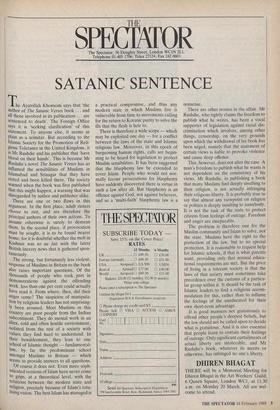THE
The Spectator, 56 Doughty Street, London WCIN 2LL Telephone 01-405 1706; Telex 27124; Fax 242 0603
SATANIC SENTENCE
The Ayatollah Khomeini says that 'the author of The Satanic Verses book ... and all those involved in its publication ... are sentenced to death'. The Foreign Office says it is 'seeking clarification' of this statement. To anyone else, it seems as Plain as a scimitar. But according to the Islamic Society for the Promotion of Reli- gious Tolerance in the United Kingdom, it is Mr Rushdie and his publisher that 'have blood on their hands'. This is because Mr Rushdie's novel The Satanic Verses has so inflamed the sensibilities of Muslims in Islamabad and Srinagar that they have rioted and been killed there. The society warned when the book was first published that this might happen, a warning that was disregarded by author and publisher alike. There are one or two flaws in this argument. In the first place, adult rioters choose to riot, and are therefore the Principal authors of their own actions. To assume otherwise is surely to demean them. In the second place, if provocation must be sought, it is to be found nearer home; , for it is doubtful whether the mob in Kashmir was so au fait with the latest British literary news that it gathered spon- taneously. The strong, but fortunately less violent, responSe of Muslims in Britain to the book also raises important questions. Of the thousands of people who took part in demonstrations against the offending work, less than one per cent could actually have read it. From where, then, did their anger come? The suspicion of manipula- tion by religious leaders has not surprising- ly been aroused. Most Muslims in this Country are poor people from the Indian subcontinent. They do menial work in an alien, cold and often hostile environment, isolated from the rest of a society with values they find hard to understand. In their bewilderment, they lean to one school of Islamic thought — fundamental- ism, by far the predominant school amongst Muslims in Britain — which seems to provide answers to all questions.
Of course it does not. Even more soph- isticated versions of Islam have never come to grips, at a theoretical level, with the relations between the modern state and religion, precisely because of Islam's tota- lising vision. The best Islam has managed is
a practical compromise, and thiis any modern state in which Muslims live is vulnerable from time to movements calling for the return to Koranic purity to solve the ills that the flesh is heir to.
There is,therefore a wide scope — which may be exploited one day — for a conflict between the laws of the state and Islamic religious law. Moreover, in this epoch of burgeoning, human rights, calls are begin- ning to be heard for legislation to protect Muslim sensibilities. It has been suggested that the blasphemy law be extended to cover Islam. People who would not nor- mally favour prosecutions for blasphemy have suddenly discovered there is virtue in such a law after all. But blasphemy is an offence against God, not against believers, and so a 'multi-faith' blasphemy law is a
nonsense.
There are other ironies in the affair. Mr Rushdie, who rightly claims the freedom to publish what he writes, has been a vocal supporter of legislation against racial dis- crimination which involves, among other things, censorship, on the very grounds upon which the withdrawal of his book has been urged, namely that the statement of certain views is liable to provoke violence and cause deep offence.
This, however, does not alter the case. A man's freedom to publish what he wants is not dependent on the consistency of his views. Mr Rushdie, in publishing a book that many Muslims find deeply insulting to their religion, is not actually infringing their religious liberty. It is probably true to say that almost any viewpoint on religion or politics is deeply insulting to somebody. It is not the task of the state to protect citizens from feelings of outrage. Freedom and anger are inseparable.
The problem is therefore one for the Muslim community and Islam to solve, not the state. Muslims have the right to the protection of the law, but to no special protection. It is reasonable to request help for Islamic schools, if that is what parents want, providing only that normal educa- tional requirements are met. But the price of living in a tolerant society is that the laws of that society must sometimes take precedence over the customs of a particu- lar group within it. It should be the task of Islamic leaders to find a religious accom- modation for this, rather than to inflame the feelings of the uneducated for their own short-term advantage.
It is good manners not gratuitously to offend other people's deepest beliefs, but the law should not be called upon to decide what is gratuitous. And it is also essential that people learn to contain their feelings of outrage. Only significant curtailments of actual liberty are intolerable, and Mr Rushdie's book, whatever its merits or otherwise, has infringed no one's liberty.


















































 Previous page
Previous page